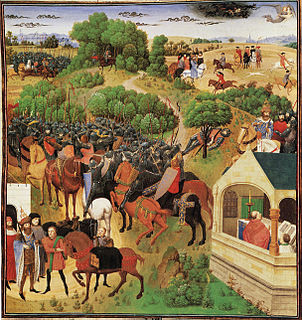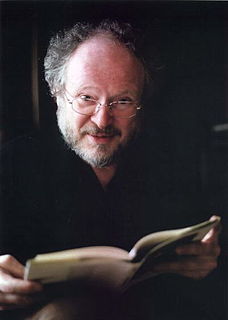
A creole language, or simply creole, is a stable natural language that develops from the simplifying and mixing of different languages into a new one within a fairly brief period of time: often, a pidgin evolved into a full-fledged language. While the concept is similar to that of a mixed or hybrid language, creoles are often characterized by a tendency to systematize their inherited grammar. Like any language, creoles are characterized by a consistent system of grammar, possess large stable vocabularies, and are acquired by children as their native language. These three features distinguish a creole language from a pidgin. Creolistics, or creology, is the study of creole languages and, as such, is a subfield of linguistics. Someone who engages in this study is called a creolist.
A narrative, story or tale is any account of a series of related events or experiences, whether nonfictional or fictional. Narratives can be presented through a sequence of written or spoken words, still or moving images, or any combination of these. The word derives from the Latin verb narrare, which is derived from the adjective gnarus. Along with argumentation, description, and exposition, narration, broadly defined, is one of four rhetorical modes of discourse. More narrowly defined, it is the fiction-writing mode in which the narrator communicates directly to the reader. The school of literary criticism known as Russian formalism has applied methods used to analyse narrative fiction to non-fictional texts such as political speeches.

The chanson de geste is a medieval narrative, a type of epic poem that appears at the dawn of French literature. The earliest known poems of this genre date from the late eleventh and early twelfth centuries, shortly before the emergence of the lyric poetry of the troubadours and trouvères, and the earliest verse romances. They reached their highest point of acceptance in the period 1150–1250.

Jean-Pierre Vigier was a theoretical physicist, known for his work on the foundations of physics, and in particular on his stochastic interpretation of quantum physics.
Narratology is the study of narrative and narrative structure and the ways that these affect human perception. It is an anglicisation of French narratologie, coined by Tzvetan Todorov. Its theoretical lineage is traceable to Aristotle (Poetics) but modern narratology is agreed to have begun with the Russian Formalists, particularly Vladimir Propp, and Mikhail Bakhtin's theories of heteroglossia, dialogism, and the chronotope first presented in The Dialogic Imagination (1975).

My American Uncle is a 1980 French film directed by Alain Resnais with a screenplay by Jean Gruault. The film juxtaposes a comedy-drama narrative with the ideas of Henri Laborit, the French surgeon, neurobiologist, philosopher and author. Its principal actors are Gérard Depardieu, Nicole Garcia, and Roger Pierre.
Gérard Genette was a French literary theorist, associated in particular with the structuralist movement and such figures as Roland Barthes and Claude Lévi-Strauss, from whom he adapted the concept of bricolage.
In narrative theory, actant is a term from the actantial model of semiotic analysis of narratives. The term also has uses in linguistics, sociology, computer programming theory, and astrology.
André du Bouchet was a French poet.
Cognitive philology is the science that studies written and oral texts as the product of human mental processes. Studies in cognitive philology compare documentary evidence emerging from textual investigations with results of experimental research, especially in the fields of cognitive and ecological psychology, neurosciences and artificial intelligence. "The point is not the text, but the mind that made it". Cognitive Philology aims to foster communication between literary, textual, philological disciplines on the one hand and researches across the whole range of the cognitive, evolutionary, ecological and human sciences on the other.

Henri Wittmann is a Canadian linguist from Quebec. He is best known for his work on Quebec French.
Magoua, which may derive from a word in Atikamekw: Makwa French: huard) which means loon, is a particular dialect of basilectal Quebec French spoken in the Trois-Rivières area, between Trois-Rivières and Maskinongé. Long before a military fort was constructed there, Trois-Rivières became in 1615 the first stronghold of the coureurs des bois outside the city of Québec. Magoua is the ethnonym applied to their descendants in the area. Magoua is the most conservative of all Quebec French varieties, including Joual. It preserves the sontaient ("étaient") characteristic of Métis French and Cajun French, has a creole-like past tense particle tà and has old present-tense contraction of a former verb "to be" that behave in the same manner as subject clitics.
Métis French, along with Michif and Bungi, is one of the traditional languages of the Métis people, and the French-dialect source of Michif.
Bourbonnais Creole is a group of French-based creole languages spoken in the western Indian Ocean. The close relation of the languages is a consequence of the similar historical and cultural backgrounds of the islands. The name is derived from the former name of Réunion Island, which was called Bourbon Island prior to 1793. Another name is Mascarene Creole, derived from the main island group associated with these languages.
Ann Banfield, is a professor Emeritus of English at the University of California, Berkeley.

Andrzej Aleksander Włodarczyk, known as André Wlodarczyk, is a Polish-French linguist.
Gerald J. Prince is an American academic and literary theoretician. He is Professor of Romance Languages at the University of Pennsylvania, where he is also affiliated with department of Linguistics and the Program in Comparative Literature, and with the Annenberg School for Communication.
René Dupuy was a French actor, theater director and théâtre manager.
André Gaudreault is a Canadian film historian and theorist who holds the Canada Research Chair in Film and Media Studies.
Márta Grabócz is a Franco-Hungarian musicologist, professor at the University of Strasbourg and senior member of the Institut Universitaire de France...